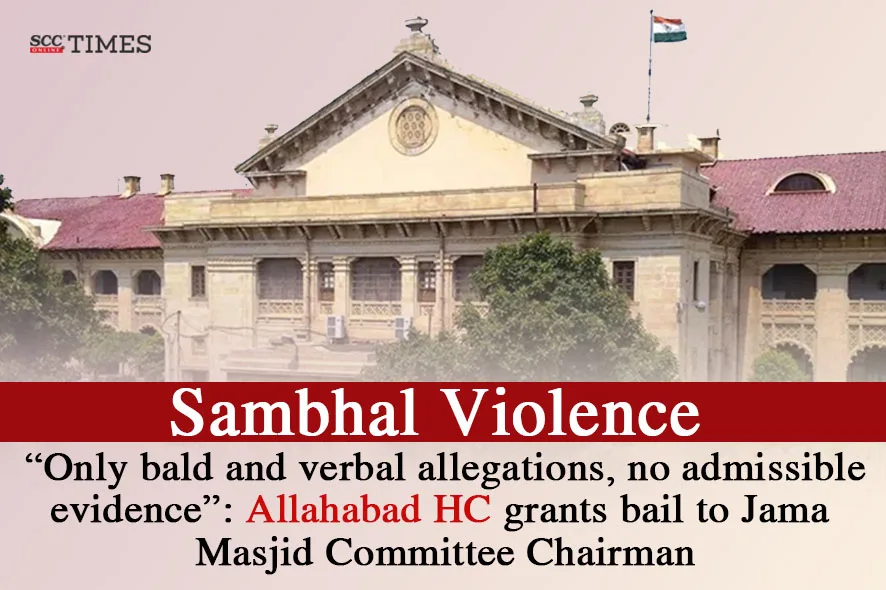Allahabad High Court: In a bail application filed by the Chairman of Sambhal Jama Masjid Committee (‘the Chairman’) in the 2024 Sambhal Masjid violence case, the Single Judge Bench of Sameer Jain, J., allowed the application, holding that, except for bald and verbal allegations, there was no admissible evidence against the Chairman.
Background
During the pendency of a civil suit concerning Jama Masjid, Sambhal, a survey of the mosque was ordered. When the Commission arrived for the survey on 24-11-2024, the accused persons, along with 700-800 unknown persons, disrupted the survey and started agitating. On their instigation, the mob damaged public property, including police vehicles. Accordingly an FIR was lodged under Sections 191(2), 191(3), 190, 221, 132, 125, 324(5), 196, 223-B, 326(F), 230, 231 of the Bharatiya Nyaya Sanhita, 2023 (‘BNS’), and Sections 3 and 4 of the Public Property Damage Prevention Act, 1984, against the Chairman, co-accused Member of Parliament Zia-Ur Rahman Barq (‘Zia’), another co-accused, and the 700-800 unknown persons.
Analysis
At the outset, the Court noted that as per the FIR, the mob acted under the leadership of Zia, whereas the Chairman was not named. The Court stated that it appeared that he was deemed instrumental by the prosecution as he was the Chairman of the Sambhal Jama Masjid Committee; however, the record did not reflect that he participated in the alleged incident.
Furthermore, the Court noted that in March 2025, the Investigating Officer issued a notice to the Chairman and arrested him upon his appearance. This fact showed bona fide on his part.
The Court also stated that Zia appeared to be the principal accused who was not arrested because he challenged the FIR before a Co-ordinate Division Bench. The Division Bench disposed of his writ petition in the light of the observations made in the case of Arnesh Kumar v. State of Bihar, (2014) 8 SCC 273, as all the offences till date were punishable with the maximum punishment of seven years. Though later offences under Sections 230 and 231 of the BNS, which are punishable with a maximum punishment of life imprisonment, were added.
The Court held that, except for bald and verbal allegations, there was no admissible evidence against the Chairman regarding the offences under Sections 230 and 231 of the BNS. The State could not place any material on record based on which the Court could infer that the Chairman prima facie appeared to have committed the aforesaid offences. The Court further remarked that during the investigation, the involvement of another co-accused was found false, and the final report was submitted in his favour.
Regarding the chairman’s antecedents, the Court noted that there was a criminal history of two other cases, but those offenses were minor and duly explained in the present application.
The Court also noted that the Chairman had been in custody for the last four months and a charge sheet had already been filed against him. The Court reiterated that unless proven guilty, an accused is deemed to be innocent and his bail application should not be dismissed for punitive purposes.
Therefore, considering the facts and circumstances, the Court held that the Chairman was entitled to be released on bail. Accordingly, the application was allowed subject to his furnishing a personal bond and two sureties each in the like amount to the satisfaction of the Court concerned.
[Zafar Ali v. State of U.P., 2025 SCC OnLine All 4461, decided on 00-00-2025]
Advocates who appeared in this case:
For the applicant: Sr. Advocate Prakhar Saran Srivastava, Senior Counsel Kamal Krishna, and Irshad Ahmad
For the respondent: A.G.A. Rupak Chaubey


